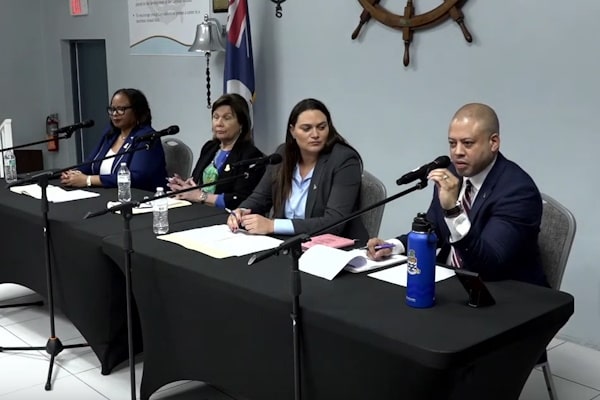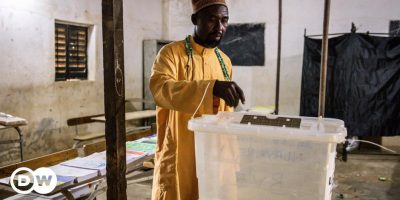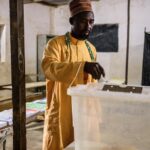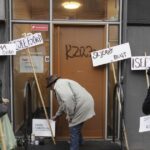(CNS): Former ministers André Ebanks, Katherine Ebanks-Wilks and Sabrina Turner and former Parliamentary Secretary Heather Bodden, who all resigned from the UPM last month citing serious mismanagement of Caucus and Cabinet, held a public meeting Wednesday where they revealed more about what drove them out of the party.
The reasons included MPs’ drunkenness in caucus and closed-door dealings with Dart by a ‘government within a government’, but many of the conflicts they revealed related to the environment. Ebanks accused the UPM of trying to change the National Conservation Act to “promote unfettered development”.
The four MPs held their first public meeting since their dramatic resignations in a packed Seafarers Hall in Prospect, where they detailed a catalogue of poor management on the part of the premier, an element of duplicity, especially relating to the climate minister’s portfolio, and an apparent abandonment of the search for consensus over important policy decisions.
“The executive was malfunctioning,” Ebanks told the audience as he spoke in detail about the poor decision-making over the last year.
Former climate and sustainability minister Ebanks-Wilks revealed how the premier and the current labour minister had effectively hijacked the processes in relation to amendments to the NCA and the ReGen contract. They held meetings with Dart, from which she was deliberately excluded and not told about.
The four MPs said they were willing to say more at this stage because an election has been called, and the government stabilised but, as a minority, it has been curbed. They were therefore freed from the shackles of collective responsibility and able to speak out.
Ebanks-Wilks said the country deserved leaders who had the public’s interests at heart and not ones making decisions based purely on what they think will get them re-elected or benefit them.
“I have no regrets,” she said as she explained how their resignation has at least prevented the UPM from introducing any more contentious legislation, such as the amendments to the National Conservation Act.
The group spoke about how they had fought to get the referendum moved to the same day as the election and to include more questions to try to save some money.
Ebanks said they believed the cruise question itself would not solve the issues surrounding the future development of cruise berthing since it was really the where, what and how much that needed to be addressed, not the idea of enhancing the facilities.
They had argued over the escalating cost of the Brac school, how cabinet papers were dealt with, and the exclusion of some ministers from discussions, fueling further division and disunity on policy as well as principles. Ebanks said that even on a good day, it had become very difficult to have a clear and objective discussion in caucus.
The former ministers also took some time to explain the problem of a Cabinet that is dependent on collective responsibility to function when the members of the inner government circle were at odds over significant policy positions and the principles of good governance.
They said that they had clung on and accepted the majority’s decisions on many occasions because of their concerns about the instability that would follow if they brought down a government and forced early elections.
However, Ebanks pointed out that during the no-confidence vote relating to Wayne Panton, he had warned of his likely resignation if things did not improve and implied that the problems in Cabinet were not just about Panton, nor were they sudden. “I had already given notice,” he said.
However, it was clear that many of the contentious issues that remained after his departure were within Panton’s former sustainability and climate resiliency ministry. As a result, Ebanks-Wilks was at the centre of what they described as the duplicitous behaviour of the premier and the labour minister when, without informing her, they held meetings with Dart about renegotiating the ReGen project rather than terminating it.
The team all agreed that this was the straw that broke the camel’s back.
Ebanks explained that they had hung on for so long because they were well aware of the risk to the country’s reputation that thier leaving could pose. But the accumulation of events, especially the discovery of the side dealings outside of the Cabinet’s existing mandate involving senior civil servants from unrelated ministries, made it clear that “Cabinet and Caucus had run amok”.
“Someone had to pull the emergency brake,” he said about how the government was functioning.
Ebanks said the political system is broken but is not beyond saving. He said there was a way to find a “more perfect union”, and invited anyone interested in transformative change to contact them and get involved in creating a new type of united leadership.
See the meeting in full below on Cayman Life TV:

















